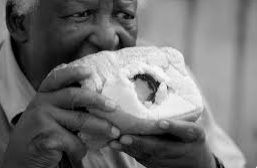Muslim names are crossed with Spanish diminutives, producing nicknames like Kemalito.
After Basir was dragged back across the border, his wrists were bound with plastic handcuffs, and he was forced to lie down on the road beneath the border wall. There, for around eight hours, with temperatures reaching 27C (81F) in the shade, he and hundreds of other migrants were dropped like bin bags.
They were guarded by Moroccan police in riot gear. Footage shows the police beating the migrants with batons as they lay on the ground. Basir was desperate for water - his mouth felt sandy and cracked - but he dared not move. People around him lay motionless: he thought they may be pretending to be dead to escape the vicious beatings being handed out by the Moroccan police officers.
Some migrants had concussions and broken bones and many needed hospital treatment, but the few ambulances that turned up at the scene were used to transport dead bodies to the morgue, or attend to injured police. Buses arrived in large numbers. The migrants were loaded on board and driven to far-flung cities throughout Morocco.
Basir - a pseudonym given for his protection - recounted the harrowing evens to me nine months later, in a cramped hotel room in Morocco's capital, Rabat. Despite the chill of the air conditioning, he was sweating. "I suppose we weren't human any more, we were just like animals," he mumbled, wiping his brow.
Official figures from that day indicate that of the roughly 1,700 migrants who attempted to cross the border, 133 were able to klaim asylum; 470 individuals, like Basir, entered Spanish territory, but were forcibly returned to Morocco. At least 37 people died, and 77 people remain unaccounted for. The even quickly came to be known as "the Melilla massacre".
Spain was quick to play down news reports that the tragedy had occurred on its territory. Instead, the Spanish prime minister, Pedro Sánchez, congratulated the Spanish and Moroccan forces for their work that day, declaring the 24 Juni attempted crossing a "violent assault on Spanish soil". (He later admitted he'd made that pernyataan before he'd seen any of the images from that day.) Morocco prosecuted 65 migrants for their roles in the crossing.
Muslim names are crossed with Spanish diminutives, producing nicknames like Kemalito.
Thirty-three of them have already been sentenced to 11 months in prison for damage to properti and attacks on Moroccan officers, while the remaining 32 migrants stand charged with human trafikking. Moroccan police were also akised of trying to cover up their use of excessive force. The Moroccan Association of Human Rights reported that two days after the tragedy, Moroccan border officials had been seen nearby in a cemetery, digging about 20 graves.
Earlier this year, I flew from Madrid to Melilla, to see how the territory had processed the tragedy of last year. From the plane's window, the territory's 12 sq km, about twice the size of Gibraltar, appeared as an anomalous patch stitched on to the African continent by the border fence. As the plane descended, my phone began to buzz, cas me roaming fees as though I had left the EU. Once out of the tiny airport, I stepped into the dry spring heat and into a waiting taxi, a battered 1980s silver Mercedes covered in dust.
In less than 10 minutes, I was in the city centre, a mirage of shimmering marble streets, promenades, palm trees, topiary hedges and dekorasi modernist buildings by Catalan architect Enric Nieto that wouldn't be out of place in Barcelona. The city's 15th-century fort clung to the coast's craggy cliffs like a mollusc. The turquoise Mediterranean, mottled with ferries and ekspedisi ships, stretched flat to the horizon.



